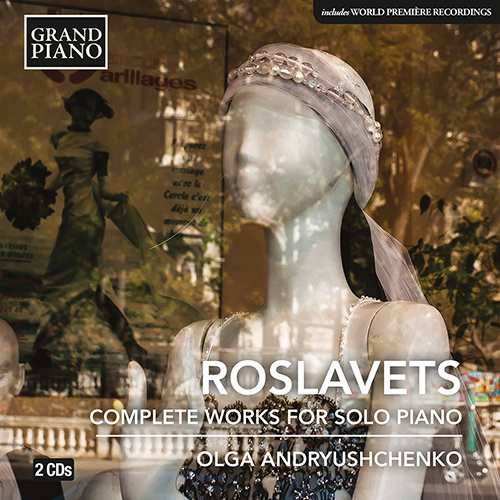
About this Release
“Nikolay Roslavets was a highly regarded composer, but by the Russian Avant Garde period of the 1920s (i.e. Alexander Mosolov, Arthur Lourié, Vladimir Deshevov, Gavriil Popov, early Dmitri Shostakovich, etc.), his music had more or less disappeared, perhaps due in part to the fact that almost everything in his music relates to the political issues of his time. However, back then, even a vague reference to a historical event, such as the cataclysmic October Revolution in 1917, was more than sufficient to evoke a powerful emotional backlash. To my ear, what makes his works extraordinary is the exceptionally strong power of the melodic line. After attempting to familiarize myself with Russian poetry, literature, and history, I am of the opinion that his music was influenced by not only all of these cultural aspects, but also, on an even grander scale, by an array of simultaneous and interconnected socio-political events of his day.” — Olga Andryushchenko
ROSLAVETS, NIKOLAY (1881–1944)
Complete Works for Solo Piano
- Olga Andryushchenko, piano
Stravinsky described Nikolay Roslavets as “the most interesting Russian composer of the 20th century,” but after decades of suppression in the former Soviet Union his significance is still being assessed even today through newly discovered and reconstructed works. Although Scriabin’s influence can be heard in earlier works, Roslavets’ constant exprimentation with original and complex compositional techniques resulted in his ‘new system of tone organization’ and ‘synthetic chords’. Olga Andryushchenko describes Roslavets’ daunting piano music as “fire and ice!”
This recording was made on a modern instrument: Steinway, Model D
Tracklist
|
1
Piano Sonata No. 1 (1914) (00:12:02)
|
|
3 Compositions (1914) (00:04:00 )
|
|
2
No. 1. Adagio (00:01:08)
|
|
3
No. 2. Agitato con passione (00:00:42)
|
|
4
No. 3. Allegretto grazioso (00:01:35)
|
|
5
Prélude (1915) (1915) (00:03:45)
|
|
2 Sochineniya (2 Compositions) (1915) (00:06:00 )
|
|
6
No. 1. Très modéré (00:02:54)
|
|
7
No. 2. Lent (00:03:47)
|
|
2 Poems (1920) (00:05:00 )
|
|
8
No. 1. Quasi prélude: Allegretto: Fervido (00:02:39)
|
|
9
No. 2. Quasi poème: Moderato (00:03:00)
|
|
10
Piano Sonata No. 2 (1916) (00:13:05)
|
|
3 Études (1914) (00:13:00 )
|
|
1
No. 1. Affettamente (00:05:41)
|
|
2
No. 2. Con dolce maniera (00:02:51)
|
|
3
No. 3. Burlando (00:06:04)
|
|
5 Préludes (1922) (00:11:00 )
|
|
4
Prélude No. 1 (00:01:53)
|
|
5
Prélude No. 2 (00:02:29)
|
|
6
Prélude No. 3 (00:02:51)
|
|
7
Prélude No. 4 (00:01:41)
|
|
8
Prélude No. 5 (00:01:57)
|
|
9
Berceuse (1919) * (00:04:08)
|
|
10
Danse (1919) * (00:01:50)
|
|
11
Valse (reconstructed by M. Lobanova) (1919) * (00:04:31)
|
|
12
Prelude (1919/1921) (reconstructed by M. Lobanova) (1919) * (00:01:17)
|
|
4 Compositions (excerpts) (1921) (00:03:03 )
|
|
13
Prélude * (00:01:27)
|
|
14
Poème * (00:01:42)
|
|
15
Piano Sonata No. 5 (1923) (00:13:16)
|
The Artist(s)
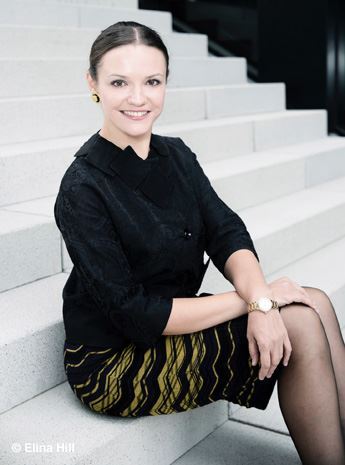 Olga Andryushchenko was educated at the Central Special Music School, and the Faculty of Historical and Modern Performing Arts of the Moscow Tchaikovsky State Conservatory under Alexei Lubimov. She also studied organ. She completed her postgraduate studies at the same conservatory, and was also a DAAD scholarship-holder at the Cologne Hochschule für Musik.
She has won a number of important prizes and awards, including the 4th International Piano Competition “Franz Schubert and the Music of Modernity” in Austria (2000), the Premium Piano Seiler 2nd International Piano Competition in Germany (2001), the Premio Vanna Spadafor International Piano Competition in Italy (2004), the Bach Competition in Leipzig (2006), the Musica Antiqua International Fortepiano Competition in Belgium (2007), the A. Scriabine International Piano Competition in Paris (2008), the N. Rubinstein International Piano Competition in Paris (2008), and the Fortepiano Competition in Schloss Kremsegg (2011).
She was a soloist of the Moscow State Philharmonic Society (2002–2004), and performs both as a soloist and in ensembles, playing piano, organ, fortepiano or harpsichord. She has also given a number of piano recitals and played with many orchestras worldwide. Olga has recorded extensively for radio and now lives in Germany.
Olga Andryushchenko was educated at the Central Special Music School, and the Faculty of Historical and Modern Performing Arts of the Moscow Tchaikovsky State Conservatory under Alexei Lubimov. She also studied organ. She completed her postgraduate studies at the same conservatory, and was also a DAAD scholarship-holder at the Cologne Hochschule für Musik.
She has won a number of important prizes and awards, including the 4th International Piano Competition “Franz Schubert and the Music of Modernity” in Austria (2000), the Premium Piano Seiler 2nd International Piano Competition in Germany (2001), the Premio Vanna Spadafor International Piano Competition in Italy (2004), the Bach Competition in Leipzig (2006), the Musica Antiqua International Fortepiano Competition in Belgium (2007), the A. Scriabine International Piano Competition in Paris (2008), the N. Rubinstein International Piano Competition in Paris (2008), and the Fortepiano Competition in Schloss Kremsegg (2011).
She was a soloist of the Moscow State Philharmonic Society (2002–2004), and performs both as a soloist and in ensembles, playing piano, organ, fortepiano or harpsichord. She has also given a number of piano recitals and played with many orchestras worldwide. Olga has recorded extensively for radio and now lives in Germany. The Composer(s)
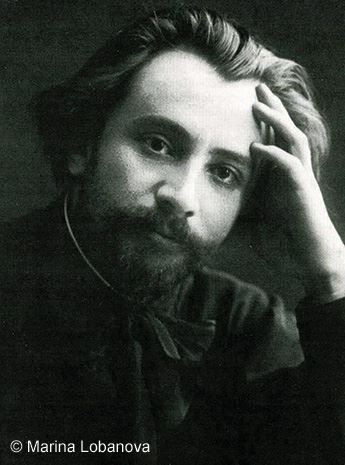 The composer, violinist and teacher Nikolai Roslavets was born in Central Ukraine and studied at the Moscow Conservatory, where his teachers included Ippolitov-Ivanov and the violinist Hrímalý. He graduated with a composition based on Byron’s Heaven and Earth and embarked, with the help of his parents-in-law, on a career as a free-lance composer and music critic. He collaborated with other leading young composers, including Myaskovsky, in the foundation of a group that in 1923 was to become the Association for Contemporary Music. After the February Revolution of 1917 he joined the Socialist Revolutionary Party, and in 1918 was a member of a group affiliated to the Bolsheviks, breaking off his connection in 1921. He did much in the following years to promote the cause of contemporary music, notably as a leader of the Association for Contemporary Music, while defending traditional musical training and earning the condemnation of the Association of Proletarian Musicians, who stigmatized him as a formalist, class enemy, Trotskyite and anti-Soviet. In 1931 he moved from Moscow to Tashkent, where he worked as a conductor, composer and director at the Music Theatre. Two years later he returned to Moscow, where he had difficulty in keeping body and soul together, proscribed by the Soviet authorities, but was teaching privately. At his death in 1944 many of his manuscripts were seized by the secret police, but others were preserved by his widow and by one of his pupils. Perestroika has allowed a revival of interest in his work.
The composer, violinist and teacher Nikolai Roslavets was born in Central Ukraine and studied at the Moscow Conservatory, where his teachers included Ippolitov-Ivanov and the violinist Hrímalý. He graduated with a composition based on Byron’s Heaven and Earth and embarked, with the help of his parents-in-law, on a career as a free-lance composer and music critic. He collaborated with other leading young composers, including Myaskovsky, in the foundation of a group that in 1923 was to become the Association for Contemporary Music. After the February Revolution of 1917 he joined the Socialist Revolutionary Party, and in 1918 was a member of a group affiliated to the Bolsheviks, breaking off his connection in 1921. He did much in the following years to promote the cause of contemporary music, notably as a leader of the Association for Contemporary Music, while defending traditional musical training and earning the condemnation of the Association of Proletarian Musicians, who stigmatized him as a formalist, class enemy, Trotskyite and anti-Soviet. In 1931 he moved from Moscow to Tashkent, where he worked as a conductor, composer and director at the Music Theatre. Two years later he returned to Moscow, where he had difficulty in keeping body and soul together, proscribed by the Soviet authorities, but was teaching privately. At his death in 1944 many of his manuscripts were seized by the secret police, but others were preserved by his widow and by one of his pupils. Perestroika has allowed a revival of interest in his work. Reviews

“This interpretation by Olga Andryushchenko is optimal.” – Ritmo
“Ms Andryushchenko is a compelling player and an illuminating guide to all of this music” – MusicWeb International
“Andryuschchenko’s playing is rich-toned and evocative. She does her best to pull the music together and in most cases succeeds, even in those pieces where Roslavets subverts her intentions with ambiguous form and drifting harmonies. Overall, my impression of his piano music is that it is extremely complex and interesting, …Recommended for its creating mood if not for aesthetic appeal.” – The Art Music Lounge

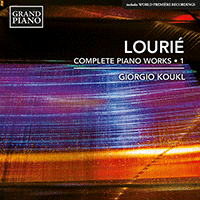
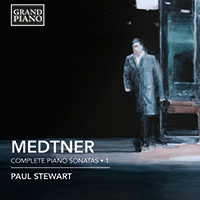
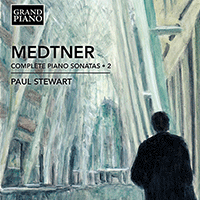
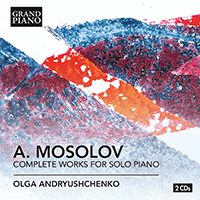
 Grand Piano has gained a reputation for producing high quality recordings of rare keyboard gems. Dedicated to the exploration of undiscovered piano repertoire, the label specialises in complete cycles of piano works by many lesser-known composers, whose output might otherwise have remained unknown and unrecorded.
Grand Piano has gained a reputation for producing high quality recordings of rare keyboard gems. Dedicated to the exploration of undiscovered piano repertoire, the label specialises in complete cycles of piano works by many lesser-known composers, whose output might otherwise have remained unknown and unrecorded.






